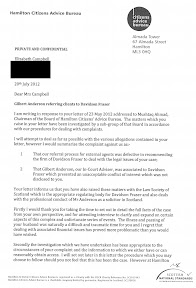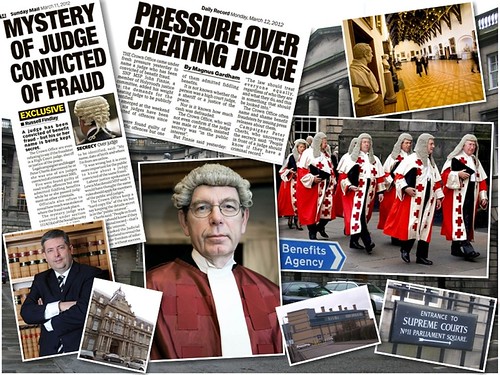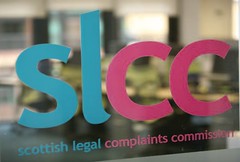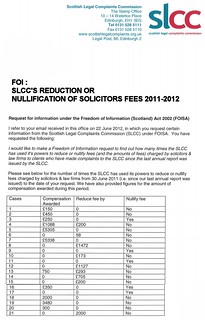 Kenny MacAskill – Reign of error as Justice Secretary since 2007 AS SCANDALS continue to rock Scotland’s legal profession, leaving a growing trail of clients who suffer heavy financial losses, the price of having a second hand High Street solicitor in charge of Scotland’s justice system for the past FIVE YEARS is clearly beginning to tell on Scots access to justice, where, with no end in sight to Kenny MacAskill’s reign of error, now entering it’s SIXTH YEAR, the Justice Secretary has now indicated his Scottish Government does not consider further independent regulation of the solicitor profession in Scotland to be necessary.
Kenny MacAskill – Reign of error as Justice Secretary since 2007 AS SCANDALS continue to rock Scotland’s legal profession, leaving a growing trail of clients who suffer heavy financial losses, the price of having a second hand High Street solicitor in charge of Scotland’s justice system for the past FIVE YEARS is clearly beginning to tell on Scots access to justice, where, with no end in sight to Kenny MacAskill’s reign of error, now entering it’s SIXTH YEAR, the Justice Secretary has now indicated his Scottish Government does not consider further independent regulation of the solicitor profession in Scotland to be necessary.
In response to a series questions raised in the Scottish Parliament by Justice Committee member Margaret McDougall MSP (West Scotland, Scottish Labour), on the subject of regulation of the legal profession, Mr MacAskill replied that there will be no further review of regulation of the Law Society of Scotland.
The Justice Secretary also indicated in his responses that the Scottish Government is apparently, supportive of the present arrangements of regulation of Scotland’s legal profession, arrangements which have seen a series of high profile corrupt solicitors escape punishment for complex frauds against their clients involving huge sums of money, while other solicitors have escaped criminal prosecution for the theft of millions of pounds of taxpayer funded legal aid.
The series of questions put to Mr MacAskill by mps Margaret McDougall are published on the Scottish Parliament’s website, among a series of evasive responses from Scottish Ministers on other topics : HERE (pdf)
Margaret McDougall (West Scotland) (Scottish Labour): To ask the Scottish Executive who oversees the work of the Law Society of Scotland.
(S4W-08503)
Kenny MacAskill: The Law Society of Scotland is an independent professional body. It is not regulated by the Scottish Government nor any other body but is subject to the provisions of the Solicitors (Scotland) Act 1980 and other enactments.
Margaret McDougall (West Scotland) (Scottish Labour): To ask the Scottish Executive whether it plans to review the regulatory system in place for the Law Society of Scotland.
(S4W-08504)
Kenny MacAskill: The Scottish Parliament has recently considered and approved two pieces of legislation which significantly modify the regulatory system in place for the Law Society of Scotland, namely the Legal Profession and Legal Aid (Scotland) Act 2007 and the Legal Services (Scotland) Act 2010. The Scottish Government has no further plans to review the regulation of the Law Society of Scotland.
Margaret McDougall (West Scotland) (Scottish Labour): To ask the Scottish Executive what assessment it has made of the performance of the Law Society of Scotland.
(S4W-08505)
Kenny MacAskill: The Scottish Government does not assess the performance of the Law Society of Scotland.
Margaret McDougall (West Scotland) (Scottish Labour): To ask the Scottish Executive what its position is on the need for independent regulation of the legal profession.
(S4W-08506)
Margaret McDougall (West Scotland) (Scottish Labour): To ask the Scottish Executive what its position is on self-regulation of the legal profession.
(S4W-08507)
Kenny MacAskill: The Law Society of Scotland is an independent self-regulating professional body for solicitors and conveyancing and executry practitioners. Section 120 of the Legal Services (Scotland) Act 2010 laid down the regulatory framework for the regulation of the Faculty of Advocates by the Court of Session. Sections 25-29 of the Law Reform (Miscellaneous Provisions) (Scotland) Act 1990 provide for the Lord President of the Court of Session and the Scottish Ministers to approve and regulate professional or other bodies which apply to enable their members to have rights to conduct litigation and rights of audience in the courts.
There are safeguards in place. Complaints about all legal practitioners can be made to the Scottish Legal Complaints Commission which is an independent body. Further, allegations of misconduct by solicitors may be heard by the Scottish Solicitors’ Discipline Tribunal, another independent body. In addition, the Legal Services (Scotland) Act 2010 provided for increased lay involvement in the work of the Law Society, and a lay majority on its regulatory committee. The Scottish Government considers these arrangements appropriate and that there are adequate safeguards. It does not consider further independent regulation of the solicitor profession in Scotland to be necessary.
Clearly, from Mr MacAskill’s responses to questions on the subject of regulation of solicitors, Scots consumers of legal services do not stand a chance against lawyers out to rip them off. Similarly, anyone wishing to bring their legal business or litigation to Scotland should take note of the fact that regulation and the lack of real safeguards against rip offs, will also let international & corporate clients down, sooner or later.
Asked about the content of Mr MacAskill’s responses to questions, Margaret McDougall told Diary of Injustice : “I have concerns about self-regulatory bodies and how “independent” they are and how they best serve the public needs. Since raising these PQs the Law society has kindly offered to meet with me to discuss my concerns and I am looking forward to meeting with them in the near future.”
Speaking to Diary of Injustice, a leading campaigner on reform of regulation of the legal profession condemned Mr MacASkill’s pro-lawyer stance to msps.
He said : “Given Mr MacAskill’s robust defence of the Law Society of Scotland and what are effectively two front companies to get lawyers off the hook - the Scottish Legal Complaints Commission & the Scottish Solicitors Discipline Tribunal, it might appear to anyone viewing the situation with a degree of knowledge or experience that the legal profession has a Scottish Minister in its pocket, bought & paid for.”
Diary of Injustice has been covering injustice against clients & consumers in Scotland’s legal system since 2006, repeating time & again the system of regulation of Scotland’s legal profession is corrupt in name, and corrupt in nature.
In spite of Mr MacAskill’s claims to msps of new regulation, the reality of dealing with Scottish solicitors has shown us time & again that nothing has changed to improve the rights of clients against vindictive, prejudiced and thoroughly dishonest regulatory practices operated by the Law Society of Scotland, Scottish Solicitors Discipline Tribunal and the Scottish Legal Complaints Commission.
Clearly however, there are some msps who do feel the system must be changed, and therefore Diary of Injustice would like to encourage readers who feel strongly on the matter to contact their msps and ask for progress and the introduction of reforms such as fully independent regulation of the legal profession in Scotland and further powers of protection for consumers, such as naming & shaming ‘crooked lawyers’, a policy now implemented in England & Wales by the Legal Ombudsman. If it’s good for the rest of the UK, we Scots can have it too .. and also, a much needed replacement in the Justice portfolio.






